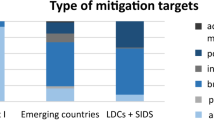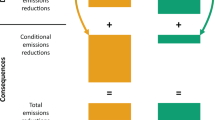Abstract
Success of the 2015 Paris Agreement, which is founded on nationally determined contributions (NDCs), hinges on whether domestic support for international environmental agreements would be undermined if countries that are crucial to the global effort fail to reduce their emissions. Here we find that citizens in China (n = 3,000) and the United States (n = 3,007) have strong preferences over the design of international climate agreements and contributions of other countries to the global effort. However, contrary to what standard accounts of international politics would predict, a survey-embedded experiment in which respondents were randomly exposed to different information on other countries’ behaviour showed that information on other countries failing to reduce their emissions does not undermine support for how international agreements are designed. While other factors still make large emission cuts challenging, these results suggest that the Paris approach per se is not posing a problem.
This is a preview of subscription content, access via your institution
Access options
Access Nature and 54 other Nature Portfolio journals
Get Nature+, our best-value online-access subscription
$29.99 / 30 days
cancel any time
Subscribe to this journal
Receive 12 print issues and online access
$209.00 per year
only $17.42 per issue
Buy this article
- Purchase on Springer Link
- Instant access to full article PDF
Prices may be subject to local taxes which are calculated during checkout



Similar content being viewed by others
Data availability
Replication data and code for the study are available in the Harvard Dataverse with the identifier https://doi.org/10.7910/DVN/D1QMP5 (ref. 33).
References
Mitchell, R. B. International environmental agreements: a survey of their features, formation, and effects. Annu. Rev. Environ. Resour. 28, 429–461 (2003).
Mitchell, R. B. International Environmental Agreements Database Project (Mitchell, R. B. & IEA Database Project, accessed 1 September 2018); http://iea.uoregon.edu/ (2017).
Keohane, R. O After Hegemony: Cooperation and Discord in the World Political Economy (Princeton Univ. Press, Princeton, 1984)
Axelrod, R. & Keohane, R. O. in Cooperation Under Anarchy 226–260 (Princeton Univ. Press, Princeton, 1986).
Keohane, R. O. & Victor, D. G. Cooperation and discord in global climate policy. Nat. Clim. Change 6, 570–575 (2016).
Hovi, J., Ward, H. & Grundig, F. Hope or despair? Formal models of climate cooperation. Environ. Resour. Econ. 62, 1–24 (2014).
Hovi, J., Sprinz, D. F., Saelen, H. & Underdal. The club approach: a gateway to effective climate co-operation? Br. J. Polit. Sci. https://doi.org/10.1017/S0007123416000788(2017).
Sprinz, D. F., Sælen, H., Underdal, A. & Hovi, J. The effectiveness of climate clubs under Donald Trump. Clim. Policy 18, 828–838 (2018).
Tingley, D. & Tomz, M. Conditional cooperation and climate change. Comp. Polit. Stud. 47, 344–368 (2014).
Ward, H. Game theory and the politics of global warming: the state of play and beyond. Polit. Stud. 44, 850–871 (1996).
Sandler, T. Global Challenges: An Approach to Environmental, Political, and Economic Problems (Cambridge Univ. Press, Cambridge, 1997).
Barrett, S. A theory of full international cooperation. J. Theor. Polit. 11, 519–541 (1999).
Off Target: Ranking of EU Countries’ Ambition and Progress in Fighting Climate Change (Climate Action Network Europe, 2018); https://go.nature.com/2TCr4WB.
Wlezien, C. The public as thermostat: dynamics of preferences for spending. Am. J. Polit. Sci. 39, 981–1000 (1995).
Burstein, P. The impact of public opinion on public policy: a review and an agenda. Polit. Res. Q. 56, 29–40 (2003).
Anderson, B., Böhmelt, T. & Ward, H. Public opinion and environmental policy output: a cross-national analysis of energy policies in Europe. Environ. Res. Lett. 12, 1–10 (2017).
Olson, M. The Logic of Collective Action (Harvard Univ. Press, Cambridge, 1965).
Lyon, T. P. & Yin, H. Why do states adopt renewable portfolio standards? An empirical investigation. Energy J. 31, 133–157 (2010).
Ince, D., Vredenburg, H. & Liu, X. Drivers and inhibitors of renewable energy: a qualitative and quantitative study of the caribbean. Energy Policy 98, 700–712 (2016).
Hertel-Fernandez, A., Mildenberger, M. & Stokes, L. C. Legislative staff and representation in congress. Am. Polit. Sci. Rev. 113, 1–18 (2018).
Oehl, B., Schaffer, L. M. & Bernauer, T. How to measure public demand for policies when there is no appropriate survey data? J. Public Policy 37, 173–204 (2017).
Tomz, M. Domestic audience costs in international relations: an experimental approach. Int. Organ. 61, 821–840 (2007).
Chaudoin, S. Promises or policies? An experimental analysis of international agreements and audience reactions. Int. Organ. 68, 235–256 (2014).
Downs, G. W. & Rocke, D. M. Tacit bargaining and arms control. World Polit. 39, 297–325 (1987).
Bernauer, T., Prakash, A. & Beiser-McGrath, L. F. Do exemptions undermine environmental policy support? An experimental stress test on the odd-even road space rationing policy in India. Regul. Gov. https://doi.org/10.1111/rego.12225 (2018).
Bechtel, M. M. & Scheve, K. F. Mass support for global climate agreements depends on institutional design. Proc. Natl Acad. Sci. USA 110, 13763–13768 (2013).
Bernauer, T. & Gampfer, R. How robust is public support for unilateral climate policy? Environ. Sci. Policy 54, 316–330 (2015).
Hainmueller, J., Hopkins, D. J. & Yamamoto, T. Causal inference in conjoint analysis: understanding multidimensional choices via stated preference experiments. Polit. Anal. 22, 1–30 (2013).
Ratkovic, M. & Tingley, D. Sparse estimation and uncertainty with application to subgroup analysis. Polit. Anal. 25, 1–40 (2017).
Bernauer, T., Dong, L., McGrath, L., Shaymerdenova, I. & Zhang, H. Unilateral or reciprocal climate policy? Experimental evidence from china. Polit. Gov. 4, 152–171 (2016).
McEvoy, D. M. & Cherry, T. L. The prospects for Paris: behavioral insights into unconditional cooperation on climate change. Palgrave Commun. 2, 16056 (2016).
Ipsos Answers to ESOMAR 28 Questions to Help Online Research Buyers (Ipsos, 2013); https://ems.ipsos-mori.com/Assets/Docs/Techniques/ESOMAR-28-Questions.pdf
Beiser-McGrath, L. F. Replication data for: commitment failures are unlikely to undermine public support for the Paris Agreement. (Harvard Dataverse, 2018); https://doi.org/10.7910/DVN/D1QMP5
Acknowledgements
This research was financially supported by European Research Council (ERC) Advanced Grant No. 295456 (Sources of Legitimacy in Global Environmental Governance) and supported by ETH Zürich. We are particularly grateful to L. Liu for help with the Chinese translations. We are also grateful to participants of the Swiss Political Science Association and Political Studies Association conferences in 2017 for helpful comments.
Competing interests
The authors declare no competing interests.
Author information
Authors and Affiliations
Contributions
L.F.B.-M. and T.B. jointly designed the study. L.F.B.-M. analysed the data. L.F.B.-M. and T.B. wrote the paper.
Corresponding author
Additional information
Publisher’s note: Springer Nature remains neutral with regard to jurisdictional claims in published maps and institutional affiliations.
Supplementary Information
Supplementary Information
Supplementary Tables 1–23, Supplementary Figs. 1–7, Supplementary Methods
Rights and permissions
About this article
Cite this article
Beiser-McGrath, L.F., Bernauer, T. Commitment failures are unlikely to undermine public support for the Paris agreement. Nat. Clim. Chang. 9, 248–252 (2019). https://doi.org/10.1038/s41558-019-0414-z
Received:
Accepted:
Published:
Issue Date:
DOI: https://doi.org/10.1038/s41558-019-0414-z
This article is cited by
-
Improving public support for climate action through multilateralism
Nature Communications (2022)
-
Understanding public support for domestic contributions to global collective goods
Climatic Change (2021)
-
Exploring the trade-offs between electric heating policy and carbon mitigation in China
Nature Communications (2020)
-
Support for climate unilateralism
Nature Climate Change (2019)
-
Climate politics, metaphors and the fractal carbon trap
Nature Climate Change (2019)



